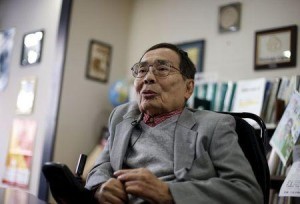
President of the non-profit Human Care Association Shoji Nakanishi, 72, who has been wheel-chair bound since a spinal cord injury at age 21, speaks during an interview with Reuters in Tokyo, Japan, February 18, 2016. REUTERS/Yuya Shino
Retired Japanese airline employee Tarou Tanzawa said he hadn’t thought much about his own death until his 84-year-old mother was diagnosed with malignant lymphoma and decided against costly and invasive life-prolonging treatment.
He watched his mother die peacefully at a nursing home where she received only palliative care after checking out of the hospital where she was diagnosed.
Soon after, Tanzawa made his own “living will“, stipulating he did not want life-prolonging treatment if he became terminally ill or was in a vegetative state.
I – Word Understanding
life-Prolonging treatment – a medical treatment or procedure that prolongs the dying process of a terminally ill patient
Palliative care – hospice care; care provided at home or care center
Living will – a document stating a person’s end-of-life medical care in case they become unable to communicate
II – Have Your Say
1. While most living wills direct to withstand (oppose) treatment, a living will also allows a person to ask for some or all available treatments and medical techniques. If you were to write your own living will, what would you instruct?
2. The view that it is not dignified for a human to be kept alive by medical treatment is becoming more common. Traditional Japanese views that families are obliged to care for elderly relatives. Would you consider “not-giving-life-prolonging-treatment” an abandonment? or dying with dignity?
3. Assisted suicide is legal in a few states in the US and some countries like Canada and Belgium. Do you think assisted suicide will be legalized in your country?
448 Aging, indebted Japan debates right to ‘die with dignity‘


